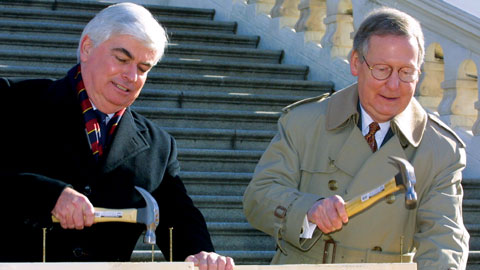Former US Senator Christopher Dodd tells Brunswick’s Casey Becker about the role of words in a life of stories
Standing offstage, Christopher Dodd decided to scrap the 35-page speech he had prepared as keynote speaker at the 2014 Rome International Film Festival. Never mind that Mr. Dodd and his staff had worked on the speech for weeks, revising and rewriting it until 3 that morning. Never mind that Mr. Dodd, CEO of the Motion Picture Association of America (MPAA), had no backup plan. Watching the panel discussion that preceded his address, Mr. Dodd decided that the speech in hand wouldn’t connect with this audience. Tearing off the top sheet of his speech, he wrote down seven bullet points on its blank side and walked out on stage. Thirty off-the-cuff minutes later, Mr. Dodd walked off stage to resounding applause and winked at his aide “How was that?” he asked.
His instincts, ease and charisma as a speaker go a long way toward explaining why Mr. Dodd is a legend in the US Senate. At the start of his Senate career, the little-known Democrat from Connecticut cut an instant national profile by delivering a scathing televised critique of President Reagan’s support of right-wing regimes in Central America. Nearly three decades later, when Senator Dodd retired from the Senate, he delivered a valedictory speech that Republican Senator Mitch McConnell – a frequent political opponent – called “one of the most important speeches in the history of the Senate.” In between, he employed his mastery of language to spearhead approval of a wealth of legislation, including the Child Care Act, the Family and Medical Leave Act and the Dodd-Frank Wall Street Reform and Consumer Protection Act.
After Mr. Dodd’s retirement from the Senate in 2010, his oratory skills made him the perfect voice of the MPAA, where he served for seven years. Now senior counsel at Arnold & Porter Kaye Scholer – and a devoted father who had his first child at age 57 – Senator Dodd sat down with his former aide, Brunswick Account Director Casey Becker, to address a subject relevant to all leaders: how to connect with an audience.
Between campaign stops, the Senate, visits back home with constituents, the MPAA, I estimate you’ve given more than 10,000 speeches.
[Laughs] I’d be hard pressed to come up with a number. After more than 40 years in public life, I am certainly no longer surprised to be called upon to share my thoughts. Whenever I showed up at, say, the New London Democratic Committee meeting, I would have been expected to say a few words, though I wouldn’t have prepared a speech. I couldn’t tell you how many speeches that I gave as a candidate and as a Senator. After leaving the Senate I frequently spoke to groups about the financial reform bill, and of course I gave speeches on behalf of the MPAA.
Some required more thought than others, for instance, responding to President Reagan on Central America. I worked hard on my speech nominating Bill Clinton in ’96 at the Democratic Convention, when I was Chairman of the Democratic National Committee. I put a lot of thought into a nominating speech for Gary Hart in 1988 – only to watch him almost nominate himself four hours before I delivered my remarks. [Laughs] I reread that speech not long ago, and it holds up pretty wel

